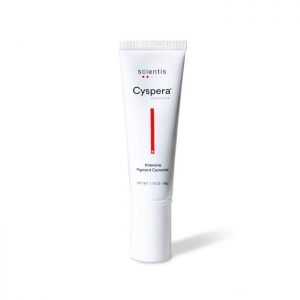Free Shipping Over $100
Free Samples With Every Purchase
Auto Replenishment Available
Authorized Reseller
Combatting Hyperpigmentation

Hyperpigmentation is a common concern that can impact people of all skin types, but it is more common for those who are getting older or experiencing hormonal shifts. While most people don’t like the way that hyperpigmentation impacts the appearance of their skin, this condition doesn’t typically indicate a need for more advanced treatment or suggest significant health issues. In this blog, we’ll walk through what hyperpigmentation is, and how dermatologists can treat it, and the DermSkincare team will recommend some top skincare products to prevent and reduce the appearance of hyperpigmentation.
What Is Hyperpigmentation?
The simplest definition of hyperpigmentation is that an area of skin darkens because it develops more melanin than the surrounding skin. Melanin is the pigment-producing part of skin cells, so this leads to dark spots or patches of hyperpigmentation on the skin. Hyperpigmentation may appear as a very small dot or encompass much larger areas. In most cases, the extent of hyperpigmentation will depend on the underlying cause. Rather than being part of one underlying condition, hyperpigmentation is the name given to several different conditions that cause skin darkening, including:
- Age spots – These dark spots on the skin may also be referred to as liver spots, sunspots, or solar lentigines. These hyperpigmented spots on the skin develop in areas that have frequent or prolonged sun exposure.
- Post-inflammatory hyperpigmentation – This form of hyperpigmentation is typically caused by an injury. This may be an accidental injury like cuts, scrapes, bruises, and burns. Hyperpigmentation can also develop after intentional injuries like surgery, tattoos, and piercings. Additionally, individuals may experience post-inflammatory hyperpigmentation due to damage from chronic skin conditions like acne, rosacea, eczema, and psoriasis. This form of hyperpigmentation typically leads to darker spots on the skin that is damaged.
- Melasma – Often referred to as the mask of pregnancy, this form of hyperpigmentation stems from fluctuation in hormone levels. It may lead to larger patches of darkened skin most often developing on the face, neck, chest, back, and trunk.
- Reactionary hyperpigmentation – Dark spots may also develop in reaction to medications, allergic response, or as a symptom of some medical conditions.
Skincare Products to Address Hyperpigmentation
One of the easiest ways to address hyperpigmentation is to integrate gentle treatments into your daily skincare routine. While some people will require more advanced dermatology procedures to fully remove hyperpigmentation, there are many skincare products available to improve the overall look of skin with hyperpigmentation, including:
Scientis Cyspera Intensive Pigment Corrector V1
 Hydroquinone has long been considered the go-to skincare ingredient to address hyperpigmentation. However, with long-term use hydroquinone can cause a number of adverse effects, including the development of blue or black spots on the skin in treated areas. For this reason, many new skincare products for hyperpigmentation are moving away from using hydroquinone. One such product is the Scientis Cyspera Intensive Pigment Corrector V1. Formulated with cysteamine, this product is ideal for long-term use to diminish the appearance of stubborn dark spots.
Hydroquinone has long been considered the go-to skincare ingredient to address hyperpigmentation. However, with long-term use hydroquinone can cause a number of adverse effects, including the development of blue or black spots on the skin in treated areas. For this reason, many new skincare products for hyperpigmentation are moving away from using hydroquinone. One such product is the Scientis Cyspera Intensive Pigment Corrector V1. Formulated with cysteamine, this product is ideal for long-term use to diminish the appearance of stubborn dark spots.
Sente Cysteamine HSA Pigment & Tone Corrector
 Sente Cysteamine HSA Pigment & Tone Corrector is another cysteamine topical cream. This one also contains Heparan Sulfate Analog (HSA). This ingredient hydrates skin and works against the body’s natural immune response which leads to post-inflammatory hyperpigmentation. Sente Cysteamine HSA Pigment & Tone Corrector is designed for safe use by individuals with all skin types, even sensitive skin.
Sente Cysteamine HSA Pigment & Tone Corrector is another cysteamine topical cream. This one also contains Heparan Sulfate Analog (HSA). This ingredient hydrates skin and works against the body’s natural immune response which leads to post-inflammatory hyperpigmentation. Sente Cysteamine HSA Pigment & Tone Corrector is designed for safe use by individuals with all skin types, even sensitive skin.
SkinCeuticals Discoloration Defense
 Another new formulation that skips the hydroquinone is SkinCeuticals Discoloration Defense. This product combines tranexamic acid, kojic acid, niacinamide, and sulfonic acid (also called HEPES). Each of these ingredients performs a specific function to help remove dead skin cells, reduce inflammation, and improve the overall tone and texture of the skin.
Another new formulation that skips the hydroquinone is SkinCeuticals Discoloration Defense. This product combines tranexamic acid, kojic acid, niacinamide, and sulfonic acid (also called HEPES). Each of these ingredients performs a specific function to help remove dead skin cells, reduce inflammation, and improve the overall tone and texture of the skin.
SkinMedica Lytera 2.0 Pigment Correcting Serum
 For those who are struggling with melasma during pregnancy, it can be difficult to find a pigment-correcting serum that is safe for expectant mothers. The SkinMedica Lytera 2.0 Pigment Correcting Serum is safe and gentle enough for use by anyone for hyperpigmentation on any area of skin.
For those who are struggling with melasma during pregnancy, it can be difficult to find a pigment-correcting serum that is safe for expectant mothers. The SkinMedica Lytera 2.0 Pigment Correcting Serum is safe and gentle enough for use by anyone for hyperpigmentation on any area of skin.
Dermatologic Procedures to Address Hyperpigmentation
In addition to skincare products to improve the appearance of skin with hyperpigmentation, there are several treatments available from your dermatologist that can deliver an even skin tone, including:
- Prescription topical medications – this may include products with ingredients like hydroquinone, retinoids, corticosteroids, tranexamic acid, azelaic acid, kojic acid, and metformin.
- Laser therapy – pulses of light or laser-based energy that target the chromophore melanin which is the polymer that causes darkening of the skin. The body is then able to naturally process and remove the melanin after it has been targeted.
- Skin treatments – chemical peels, microneedling, microdermabrasion, and similar procedures both remove outer layers of skin and trigger the body’s natural healing abilities to improve skin tone, texture, and discoloration.
Work with a Dermatologist to Develop a Hyperpigmentation Treatment Plan
Whether you’re looking for a dermatologic treatment for hyperpigmentation or you just want to boost your skincare routine, the U.S. Dermatology Partners team is here for you. They offer a range of professional dermatologic procedures to address skin health concerns like hyperpigmentation. They can also work with you to develop a skincare routine that will improve overall skin tone and texture for healthier, more beautiful skin. If you’re ready to get started, simply take a few moments to complete their online scheduling request form. Once they hear from you, a dermatologist in a local practice will be in touch to finalize the details of your visit.








